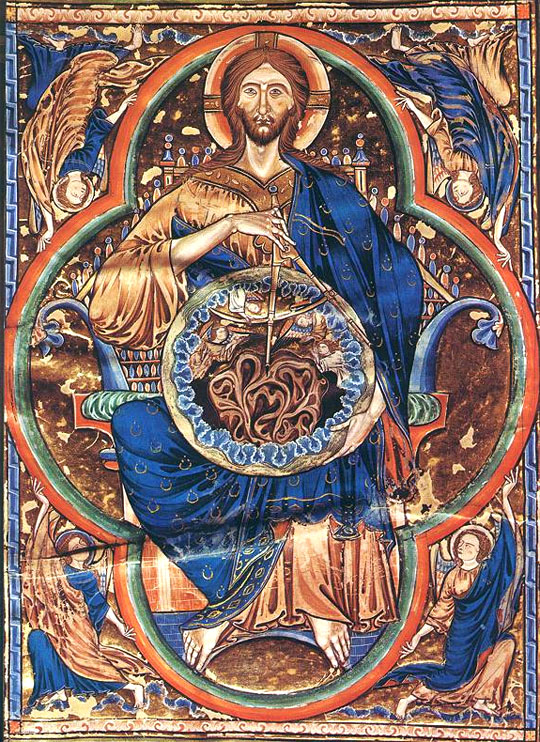 |
| Creation is not a one-time event but a continual holding in being |
[Scientific explanation] would be moot if Biblical creation were found to be true ... why bother to find out what makes people sick if it would only take prayer to cure you? Why bother to discover what cause earthquakes, volcanic eruptions or other natural disasters if it the just punishment of a displeased God? There would be absolutley no need for any science if ... that's how God did it, is the answer to every question!
TOF is somewhat mystified by this contention, and for two reasons.
1. The first is that creation has nothing to do with people getting sick or with volcanic eruptions. Simil atque, science has nothing to say about creation. Creation is the joining of an essence to an act of existence; that is, it is to make something actually exist. Transformation, or "motion," is a change of something that actually exists into something else. These transformations are the proper object of natural science. To regards being-as-such as a creation need not inhibit someone from discovering the causes of its motions.
 |
| What is the cause of the boiling? |
 |
| Ah! Earl Grey decaff! |
When asked about the possibility of a Tea Maker, the physicist honestly replies, "Sire, I have no need of that hypothesis." And indeed, he does not. For in the physics of boiling water, the desire to drink tea is not an efficient cause, and so is methodologically irrelevant.
 |
| Grasping "boiling water" does not mean grasping boiling water. |
But notice: the fact that I may recognize a Higher Purpose behind the boiling of the water does not prevent me from investigating the physics of it. In fact, in my desire to drink tea, I may be spurred, nay indeed, impelled to study and grasp the mechanics by which the boiling is accomplished.
The medieval natural philosophers, recognizing that final causes were primary causes, knew that they stood "outside the physical process," so to speak. To make tea is why I boil the water. It is not part of how the water boils.
 |
| The Thomian "pleat" manifold is an example of an attractor basin |
"But, TOF," (I hear you say), "you said there were two reasons you were mystified by Mr. Cheese's contention! What pray tell is the second?"
Easily said. If believers in "Biblical creation" were satisfied with "Goddidit" and did not look for secondary, instrumental causes, then we should expect to find hard empirical evidence in history that this was the mainstream reaction of Christians, especially in the Middle Ages, oft called the Age of Faith because they were always demanding reasons for this or that. So what does the empirical evidence say?
2. The empirical facts of history say that the Christians did not agree with Mr. Cheese.
 |
| Big Al |
“In studying nature we have not to inquire how God the Creator may, as He freely wills, use His creatures to work miracles and thereby show forth His power; we have rather to inquire what Nature with its immanent causes can naturally bring to pass.”And in his De mineralibus, he writes:
"It is the task of natural science not simply to accept what we are told but to inquire into the causes of things."Or more directly, William of Conches in (iirc) the Dragmatikon:
"[They say] 'We do not know how this is, but we know that God can do it.' You poor fools! God can make a cow out of a tree, but has He ever done so? Therefore show some reason why a thing is so, or cease to hold that it is so."And Big Al, Billy Conches, Tommy Aquinas, Gus Hippo, and others were not marginal players. This was the mainstream position. Naturally, in every age we have Biblical literalists. They are especially common among atheists and fundamentalists. But literalism leads folks like Mr. Cheese to tie themselves into knots over what their theory says Christians ought to have thought, in opposition to what the Christians' own writings show that they did think. But that should be a clue that naive literalism is not an adequate reading protocol.
 |
| God ordering the world by number, weight, and measure. Bible Illumination c. 1252-70. Cathedral Museum, Toledo, Spain. |
We also find "Solomon" extolling natural science (Wis. 7: 17-22):
"For [God] gave me sound knowledge of what exists,This does not sound at all like urging the neglect of natural sciences or secondary causes. It sounds like they regarded the study of such things was a worthy occupation for grown-ups, another mental prerequisite.
that I might know
the structure of the universe and the force of its elements,
The beginning and the end and the midpoint of times,
the changes in the sun’s course and the variations of the seasons,
Cycles of years, positions of stars,
natures of living things, tempers of beasts,
Powers of the winds and thoughts of human beings,
uses of plants and virtues of roots—
Whatever is hidden or plain I learned, for Wisdom, the artisan of all, taught me."
The key was the doctrine of secondary causation, as expressed here by :
Augustine of Hippo:
"It is therefore, causally that Scripture has said that earth brought forth the crops and trees, in the sense that it received the power of bringing them forth. In the earth from the beginning, in what I might call the roots of time, God created what was to be in times to come."IOW, Gus thought that nature was "packed" with natural powers by which it would accomplish things. Like evolution or something.-- De genesi ad litteram, Book V Ch. 4:11
William of Conches:
“[God] is the author of all things, evil excepted. But the natures with which He endowed His creatures accomplish a whole scheme of operations, and these too turn to His glory since it is He who created these very natures.”Thomas Aquinas:
"Nature is nothing but the plan of some art, namely a divine one, put into things themselves, by which those things move towards a concrete end: as if the man who builds up a ship could give to the pieces of wood that they could move by themselves to produce the form of the ship.
-- Commentary on Physics II.8, lecture 14, no. 268
Mr. Cheeze's concern was that Christianity be seen as an impediment or roadblock to the development of science, and so he confused belief in Christianity with a sort of paganism.
+ + +
What has all this to do with writing science fiction?
| Noble Queen dubs Brave Knight Mate in three moves. |
Well, a lot of SF is populated by such stock figures. Fewer now than in days of yore. But one of the reasons for characters that "feel thin" is that the writer cannot get inside their skin and write them from the inside. This is especially true of those characters supposed to be "bad guys." More so even than the "hero" the bad guys have transparently wicked motives. Of course, the businessman will be an evil conspirator. Of course, the religious character is a rube or a hypocrite. Of course, the general's first impulse is to launch the nukes. Similar, of courses afflict the favored characters, but "the Other" is especially hard to draw with empathy.
So here's the lesson: the more mythological your understanding of the Other, the more of a stock cut-out your character will be. The discourse above featured a mythological understanding of how Christians engaged natural science; but it might be anyone that you grasp first as a Category rather than as a Person; and it might be in any walk of life.
And speaking of the chansons de geste..... But that is for another time.


I think Roland does sort of give us a motivation in passing; but the one he gives just makes your point: "Pagans are wrong, Christians are right" (Paien ont tort e crestien ont dreit) And you're quite right; that's a stock-character motivation and it's not too far from that of (say) Lucky Starr. The difference, I suppose, is that it's in some sense supposed to be the whole point of Roland that he would see it that way; a Roland who saw shades of gray between those two would be incapable of being so completely Roland-ish, and would lack both his unshakable resolve and generous magnanimity. Whereas there often seems a disparity between what the science-fiction hero is supposed to be and the motivation he has (although this will depend on the skill of the author, of course).
ReplyDelete" Creation is the joining of an essence to an act of existence; that is, it is to make something actually exist. Transformation, or "motion," is a change of something that actually exists into something else."
ReplyDeleteNot terribly off subject I hope, I read (misread? ) an A/T philosopher state that even God does not create something out of nothing. Yet, if true out of what did he create the world, his rib? (That's a joke, you see, in the Bible. . .well I guess you knew that . . . back to my confusion) And, if false, is God's creation an exception to the rule, " Ex nihil, nihil fit" ?
@Martin
ReplyDeleteI am no theologian; but as I understand it, God does not create from nothing, but rather from his own intellect and will, which are not nothing but are "Existence Itself." I suspect that the whole "ex nihil, nihilo fit" thingie was how one concluded to the existence of a being who necessarily existed. Someone else lurking here may know more than me.
I'm only a baby theologian as of yet (Working on wrapping up undergrad) but I think you've got the gist of it. Creation is essentially an ongoing manifestation of God's power-- at least in the Wesleyan tradition.
ReplyDelete"understanding and appreciation of the beauty and order of the universe to making useful and profitable gadgets for man's dominion over the universe,"
ReplyDeleteI would say that the great and good scientists have always been motivated by the quest for understanding and beauty. Great physicists have been quite explicit about it.
@Gyan: Definitely; and Darwin himself was one of them. But that was subordinated to usefulness. You always have to convince the funding body, after all.
ReplyDeleteThe whole shift from four causal categories to metrical and controllable efficient causes was precisely to assert control over nature, regardless whether one admired it at the same time.
Maybe this will be helpful on the question of whether God created the universe from "nothing."
ReplyDeletehttp://www.newadvent.org/cathen/04470a.htm
@TOF, So if we believe in final causes, we can not assert control over nature?
ReplyDelete@Gyan, You have it exactly backwards. The people who first asserted that final causes did not matter did so because they didn’t care about anything BUT asserting control over nature. Those of us who believe in all four of the Aristotelian causes can care about whatever we choose.
ReplyDeleteNot only that, but the efficient causes that enable males to dominate female nature and exercise dominion over the universe (cf. F.Bacon, R.Descartes) can only be understood as natural laws iff they act "always or for the most part" toward the same suite of effects; and it is that "towardness" that defines finality.
ReplyDeleteOtherwise, you are stuck with nothing but chance correlations that may or may not remain true elsewhere and elsewhen. (cf. Maimonides and ibn Rushd and their critique of occasionalism).
And indeed, cf. Hume and his critique of causality of any kind.
ReplyDeleteYou are always so erudite, Mike. I am in perpetual awe.
ReplyDeleteThat must mean that I am awe-full.
ReplyDeleteThe secret to erudition is this: when I don't know what I'm talking about, I don't talk. Well, OK, so sometimes I'm at an SF con.
Catholicism paved the way for the modern scientific method during the high Middle Ages with the understanding that the world is a creation that can be studied and dissected. I recommend a book called “How The Catholic Church Built Western Civilization” by Thomas E. Woods. People don’t know history and don’t care about history unless it supports their view.
ReplyDeleteI do not know what context or venue Mr. Cheese is writing in, but his comments do resonate with me on a certain level.
ReplyDeleteWhile I have been completely converted to the Catholic worldview for some years now, I was raised a fundamentalist protestant. I cannot speak for all protestants, but I think I can safely say that the ones I grew up around did truly have a viewpoint similar to the one Mr. Cheese expresses. My mother is a case in point. She believes that you shouldn't question anything about God or how the world works, you should just have faith that it does. Nature, to people such as her, is something that should be looked at, admired, marveled at but not questioned. There are strains of protestantism that look at the world and believe that you should not try to figure out the how or even the why beyond "God did it". And I suppose it is possible that if people like that were culturally dominant, much of science would be done away with. Even the study of history, even theology, is something that my mother and others like her are strongly suspicious of and think is totally unnecessary. I feel a certain sense of horror when I look back and realize that once I held similar beliefs.
If such is what Mr. Cheese is referring to, then I can understand his revulsion and his conclusions. Fortunately, that is only a subset of Christianity and the Catholic Church has always known better, as you pointed out.
You have a good point. Eastern Orthodox theologians have said that Protestantism is the next step to atheism, so it may be that Mr. Cheese is more familiar with such people. It may also be why Protestant sects have a short half-life before they decay and split into two or more sub-sects. Eventually, perhaps, they will all become leaden atheists.
ReplyDelete